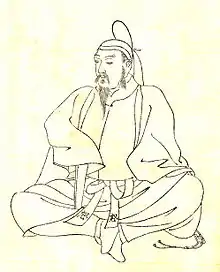Fujiwara no Kurajimaro | |
|---|---|
 | |
| Born | 734 |
| Died | August 5, 775 |
| Nationality | Japanese |
| Parents | Fujiwara no Umakai (father) |
Fujiwara no Kurajimaro (藤原 蔵下麻呂, 734 – August 5, 775) was a Japanese statesman, courtier and politician during the Nara period.[1]
Career at court
He was a minister during the reign of Empress Shōtoku. He held positions of hyōbu-kyō (chief military officer) and sangi (associate counselor).[1]
Shōtoku placed her imperial bodyguards under the command of Kurajimaro.[2]
In 764, Kurajimaro was a leader of forces opposing Fujiwara no Nakamaro, also known as Emi no Oshikatsu.[3] Nakamaro and others unsuccessfully plotted with Emperor Junnin against retired Empress Kōken and the monk Dōkyō resulting in a military confrontation known as Fujiwara no Nakamaro Rebellion.
After stability was restored, Kurajimaro was placed in charge of the party escorting Emperor Junnin to Awaji province.[4]
Genealogy
Kurajimaro was the ninth son of Fujiwara no Umakai.
Notes
- 1 2 Nussbaum, Louis-Frédéric. (2005). "Fujiwara no Kurajimaro" in Japan Encyclopedia, p. 205, p. 205, at Google Books.
- ↑ Hall, John Whitney. (1993). The Cambridge History of Japan: Ancient Japan, p. 264., p. 264, at Google Books
- ↑ Nussbaum, p. 205, p. 205, at Google Books; Titsingh, Isaac. (1834). Annales des empereurs du japon, p. 77., p. 77, at Google Books
- ↑ Ponsonby-Fane. (1959). The Imperial House of Japan, p. 173.
References
- Nussbaum, Louis-Frédéric and Käthe Roth. (2005). Japan encyclopedia. Cambridge: Harvard University Press. ISBN 978-0-674-01753-5; OCLC 58053128
- Titsingh, Isaac. (1834). Annales des empereurs du Japon (Nihon Odai Ichiran). Paris: Royal Asiatic Society, Oriental Translation Fund of Great Britain and Ireland. OCLC 5850691